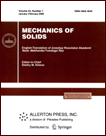 | | Mechanics of Solids
A Journal of Russian Academy of Sciences | | Founded
in January 1966
Issued 6 times a year
Print ISSN 0025-6544
Online ISSN 1934-7936 |
Archive of Issues
| Total articles in the database: | | 13427 |
| In Russian (Èçâ. ÐÀÍ. ÌÒÒ): | | 8178
|
| In English (Mech. Solids): | | 5249 |
|
| << Previous article | Volume 42, Issue 4 / 2007 | Next article >> |
| P. G. Morev, "A version of the finite element method for frictional contact problems," Mech. Solids. 42 (4), 640-651 (2007) |
| Year |
2007 |
Volume |
42 |
Number |
4 |
Pages |
640-651 |
| Title |
A version of the finite element method for frictional contact problems |
| Author(s) |
P. G. Morev (Orel State Technical University, Naugorskoe sh. 29, Orel, 302020, Russia, avtopl@ostu.ru) |
| Abstract |
We propose a method for solving frictional contact problems which is based on including the generalized coordinates of absolutely rigid bodies in the degrees of freedom of the system under study and on varying the functional of the variational problem with respect to these coordinates. As a result, one can include the generalized coordinates or the energy-conjugate generalized forces directly in the right-hand side of the resolving system of equations, which permits easily taking into account any laws of motion or loading of absolutely rigid bodies. |
| References |
| 1. | E. R. Gol'nik, N. I. Gundorova, and A. A. Uspekhov, "Incremental
Discrete Modeling of Frictional Contact Systems of Elastic Bodies
on the Basis of a Nonincremental Algorithm," Izv. Vyssh. Uchebn.
Zaved. Mashinostroenie, No. 3, 9-14 (2000). |
| 2. | A. S. Kravchuk,
Variational and Quasivariational Inequalities
in Mechanics (Izd-vo MGAPI, Moscow, 1997)
[in Russian]. |
| 3. | V. S. Davydov and E. N. Chumachenko,
"FEM Implementation of the Contact Interaction
for Problems of Forming Continuous Media,"
Izv. Akad. Nauk. Mekh. Tverd. Tela,
No. 4, 53-63 (2000)
[Mech. Solids (Engl. Transl.)]. |
| 4. | W. Peter and A. Christensen,
"A Semi-Smooth Newton Method for Elasto-Plastic Contact Problems,"
Intern. J. Solids and Struct.
39 (8), 2323-2341 (2002). |
| 5. | F. Armero and E. Petocz,
"A New Dissipative Time-Steeping Algorithm
for Frictional Contact Problems:
Formulation and Analysis,"
Comput. Methods Appl. Mech. and Eng-ng
179 (1-2), 151-178 (1999). |
| 6. | Xiaoming Guo, Roulei Zhang, and Yinghe She,
"On the Mathematical Modeling for
Elastoplastic Contact Problem and Its Solution
by Quadratic Programming,"
Intern. J. Solids and Struct.
38 (44-45), 8133-8150 (2001). |
| 7. | P. Alart, M. Barboteu, and F. Lebon,
"Solution of Frictional Contact Problems by an EBE Preconditioner,"
Comput. Mech.
20 (4), 370-378 (1997). |
| 8. | D. Barlam and E. Zahavi,
"The Reliability of Solution in Contact Problems,"
Comput. and Struct.
70 (1), 35-45 (1999). |
| 9. | A. Jorge and J. Lue,
Numerical Solution of Large Sparse Systems of Equations
(Mir, Moscow, 1984)
[in Russian]. |
| 10. | S. Pissanetski,
Technology of Rarefied Matrices
Sparse Matrix Technology
(Academic Press, New York, 1984; Nauka, Moscow, 1988). |
| 11. | A. A. Pozdeev, P. V. Trusov, and Yu. I. Nyashin,
Large Elastoplastic Deformations: Theory, Algorithms, and Applications
(Nauka, Moscow, 1986)
[in Russian]. |
| 12. | B. A. Dubrovin, S. P. Novikov, and A. T. Fomenko,
Modern Geometry
(Nauka, Moscow, 1979; Springer, New York, 1990). |
| 13. | E. P. Unksov, W. Johnson, V. L. Kolmogorov, et al.,
Plastic Deformation Theory for Metals
(Mashinostroenie, Moscow, 1983)
[in Russian]. |
| 14. | B. Schieck and H. Strumpf,
"The Appropriate Corotational Rate,
Exact Formula for Plastic and Constitutive Model
for Finite Elastoplasticity,"
Intern. J. Solids and Struct.
32 (24), 3643-3667 (1995). |
|
| Received |
12 April 2004 |
| Link to Fulltext |
|
| << Previous article | Volume 42, Issue 4 / 2007 | Next article >> |
|
 If you find a misprint on a webpage, please help us correct it promptly - just highlight and press Ctrl+Enter If you find a misprint on a webpage, please help us correct it promptly - just highlight and press Ctrl+Enter
|
|

 Russian
Russian  English
English